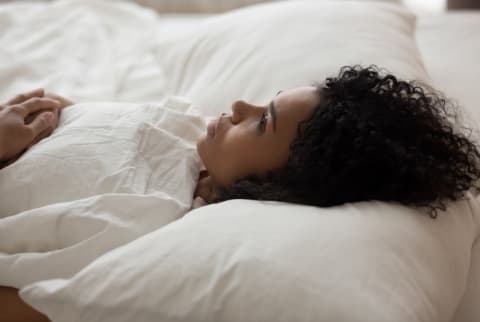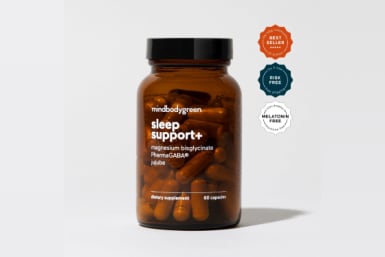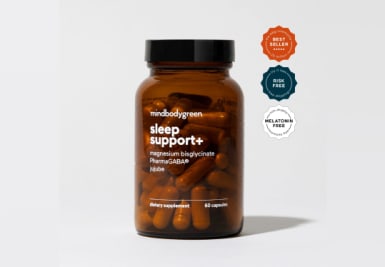8 Warning Signs Of Sleep Apnea & When To See A Doctor


It's easy to write off tiredness to a busy schedule or one too many commitments. But chronic sleepiness should be taken seriously. If you are always ready for a nap, no matter how many hours of sleep you get, it could be a sign of obstructive sleep apnea, a common (but wildly undiagnosed) sleep disorder.
We asked integrative sleep physician and women's sleep expert, Valerie Cacho, MD, about the main warning signs of sleep apnea, when to see a doctor, and why early treatment is so important.
Signs of sleep apnea
Obstructive sleep apnea occurs when one's airway is blocked during sleep, reducing airflow and causing pauses in breathing. Sleep apnea can start at any age, and some of the risk factors include sex (men are 2-3 times more likely to have it), alcohol use, cigarette smoking, weight gain, and menopause.
Every 1 in 5 adults has at least a mild form of sleep apnea, but here's the kicker: the vast majority of cases go undiagnosed. Cacho estimates that 80% of men and 90% of women with OSA don't know that they have it. According to a review article in the Proceedings of the American Thoracic Society, this underdiagnosis largely stems from a lack of symptom awareness.
"It is remarkable that despite all of the clinical and scientific advancements regarding obstructive sleep apnea in the last two decades, a great majority of those affected remain undiagnosed," the report reads1. "The lack of an appropriate level of case identification is partially driven by the fact that patients are frequently unaware of the associated symptoms that are often identified either by a bed partner or family member."
Cacho explains that the main signs of OSA are as follows:
- Snoring
- Gasping for air when asleep
- Difficulty maintaining sleep
- Daytime sleepiness
- Morning headaches
- Nocturia (frequently needing to pee in the middle of the night)
- Teeth grinding
- Mood swings
When to see a doctor
"Any organ that needs oxygen can be impacted by OSA," says Cacho, making it a potentially dangerous disorder if left untreated.
Sleep apnea has been associated with an increased risk of high blood pressure2, cardiovascular disease and heart attacks3, and stroke. "People with untreated sleep apnea can also have problems with diabetes, metabolic syndrome, obesity, kidney disease, and even problems with their memory, which may result in dementia if left untreated for an extended period," says Cacho.
On the bright side, early treatment of sleep apnea makes a big difference in preventing some of the worst consequences of the disorder4.
If you or a bed partner has one or more of these symptoms (even just snoring!), it's important to raise them at your next doctor's appointment or schedule a check-in with a certified sleep specialist. From there, you might be a candidate for an overnight sleep study or at-home test.
If you're diagnosed with sleep apnea, Cacho explains you may be put on a treatment of positive airway pressure therapy, positional therapy, dental treatments, or surgery. Your physician may also point you toward lifestyle changes that can help with symptom management, such as breathing routines and diet changes.
Once you get a better handle on your sleep apnea, you'll likely find your overall sleep quality improves, translating to more energy, a better mood, a sharper mind, and so much more—yet another reason to get symptoms checked out.
Even if you don't have the disorder, talking through your symptoms with a physician can help you put a plan in place for improving your sleep. You might want to set a stricter bedtime schedule, limit electronics at night, better prioritize stress management, or start taking a sleep supplement.
The takeaway
Every 1 in 5 adults suffers from obstructive sleep apnea—but you'd never know it since the condition is very underdiagnosed. If you snore, gasp for air during sleep, or constantly feel tired, it's worth seeing a doctor for a checkup: your sleep is well worth it.

Emma Loewe is the Sustainability and Health Director at mindbodygreen and the author of Return to Nature: The New Science of How Natural Landscapes Restore Us. She is also the co-author of The Spirit Almanac: A Modern Guide To Ancient Self Care, which she wrote alongside Lindsay Kellner.
Emma received her B.A. in Environmental Science & Policy with a specialty in environmental communications from Duke University. In addition to penning over 1,000 mbg articles on topics from the water crisis in California to the rise of urban beekeeping, her work has appeared on Grist, Bloomberg News, Bustle, and Forbes. She's spoken about the intersection of self-care and sustainability on podcasts and live events alongside environmental thought leaders like Marci Zaroff, Gay Browne, and Summer Rayne Oakes.

